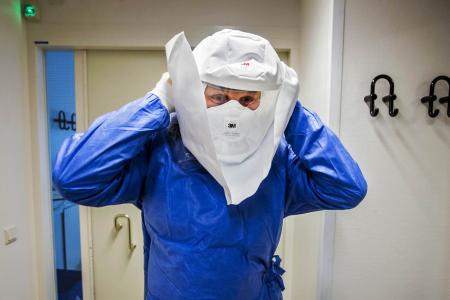5 things Singapore is doing to combat the spread of infectious diseases like Ebola
The Ebola epidemic has killed more than 4,900 people. So far, a majority of the cases have been in West African countries. But what if it arrives here?
Here's what Singapore is doing to combat the spread of the virus.
Visa restrictions
Starting Wednesday, citizens of Guinea, Liberia and Sierra Leone will need a visa to enter Singapore.
The three West African countries are the worst-hit by the Ebola epidemic.
Currently, these citizens do not need a visa to travel here.

The health ministry said in a statement: "The visa requirement will allow for better oversight of the entry of nationals from these countries, as well as facilitate possible contact tracing."
"In addition, it will allow Singapore to inform the nationals of these countries during the visa application process of our Ebola health advisory and actions they should take, should they develop symptoms while en route or during their stay in Singapore."
Screening at airports
Passengers from countries with Ebola cases are screened for their temperature when they arrive at Changi Airport.

File photo of thermal scanners used at Changi Aiport in 2009.
They also have to fill up of a health declaration card, which includes their contact details.
Those found to have fever will be taken by ambulance to Tan Tock Seng Hospital for further assessment.
Travellers who are well but identified as having possible exposure to the Ebola virus will be quarantined or put under surveillance depending on a risk assessment.
Protection for healthcare workers
Suspected Ebola patients and confirmed cases will be taken to the Communicable Diseases Centre at TTSH in a special ambulance.
If necessary, they may even be put in a portable medical isolation unit while en route.
Healthcare workers dealing with these patients will be clothed in material that will cover every inch of their body.
TTSH has 10,000 pieces of such personal protective equipment, which has to be disposed of once used.
Protection for laboratory workers
Researchers at the DSO National Laboratories have to put on a suit of protective equipment, including two pairs of gloves, when preparing blood samples from suspected Ebola patients for tests.
DSO has tested two suspected Ebola samples since August.
Beyond Ebola
As early as 2018, Singapore will get a dedicated building for managing infectious diseases which can be locked down during large outbreaks.
Called the National Centre for Infectious Diseases, it will have a screening centre which can hold 520 patients and ward cubicles that can turned into isolation rooms.
The 14-storey building will have 17 inpatient wards housing 330 beds.
Visitors, patients and staff will get their own lifts to reduce the risk of cross-infection.
The centre will be connected to TTSH.
Sources: AFP, The Straits Times
Get The New Paper on your phone with the free TNP app. Download from the Apple App Store or Google Play Store now

